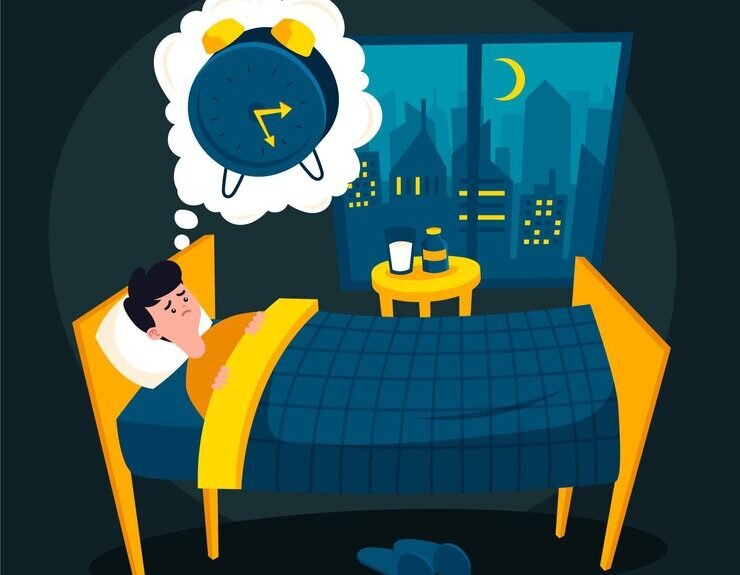Why Sleep Is Vital for Your Health
Sleep is often overlooked as a mere luxury or downtime in our fast-paced world, but the truth is that it’s one of the most important factors influencing our overall health. If you’re not getting enough sleep or if the quality of your rest is poor, you could be putting your physical and mental health at risk.
In this article, we’re going to explore how sleep affects your health, why sleep deficiency is dangerous, and how making sleep a priority can improve your life. We’ll discuss not only the science behind sleep’s impact on your brain and body but also practical tips to help you sleep better and reap the benefits of a good night’s rest.
How Sleep Deprivation Affects Your Mental Health
Sleep is not just about recharging your body it’s also essential for mental well-being. The brain remains active even during sleep, working hard to process emotions, memories, and all the information you’ve absorbed throughout the day. If you don’t get enough sleep, your ability to manage stress, control your emotions, and think clearly becomes compromised.
The Impact of Sleep on Cognitive Functions

Ever had a moment where you couldn’t remember something important after a sleepless night? This isn’t just a coincidence. Sleep directly impacts your ability to focus, retain information, and make decisions. Research has shown that sleep is necessary for consolidating memories, which means that your brain actively stores the information you’ve learned while you sleep. Without enough sleep, this memory consolidation process is disrupted.
When you don’t get enough sleep, your brain struggles to keep up with the demands of daily life. As a result, simple tasks become more difficult, and decision-making takes longer. This is why sleep-deprived individuals often experience increased cognitive fog, leading to mistakes at work, poor academic performance, and slower reaction times.
Sleep and Emotional Health

Sleep has a significant influence on your mood and emotional state. The brain uses sleep to process and regulate emotions. Lack of sleep can make you more irritable, anxious, and even prone to feelings of depression. Inadequate rest has been linked to heightened emotional responses and a decreased ability to cope with stress.
In fact, research shows that sleep deprivation can make it harder to regulate negative emotions, leading to mood swings, frustration, and even aggression. If you’re feeling “on edge” or excessively stressed, poor sleep could be contributing to your emotional imbalance.
For people already struggling with mental health conditions like anxiety or depression, sleep deprivation can make symptoms worse. Insufficient sleep can lead to a vicious cycle where poor sleep worsens mental health, and in turn, mental health issues further disrupt sleep.
How Sleep Affects Your Physical Health
While sleep’s effects on mental health are profound, its impact on physical health is just as important. Sleep is a restorative process for your body, helping to repair tissues, maintain a healthy immune system, and even regulate critical bodily functions like metabolism and blood sugar levels.
Sleep and Heart Health

Your heart benefits from the healing powers of sleep. During sleep, your blood pressure drops, giving your heart a chance to rest and recover from the strain of daily activities. Chronic sleep deprivation can lead to higher blood pressure, increased stress on the cardiovascular system, and an elevated risk of heart disease and stroke. In fact, studies have shown that people who consistently get less than 6 hours of sleep each night are at a significantly higher risk of developing heart-related problems.
Moreover, sleep plays a crucial role in controlling your body’s inflammation levels. Inflammation is a natural immune response, but when chronic and unchecked, it can contribute to serious conditions like cardiovascular disease. Sleep helps to keep inflammation in check, reducing the risk of conditions like atherosclerosis (hardening of the arteries) and other heart-related issues.
Sleep, Hormones, and Weight Management

Did you know that sleep influences your appetite? Your body makes less leptin, a hormone that indicates fullness, and more ghrelin, which increases hunger, when you don’t get enough sleep.
This hormonal imbalance can make you feel hungrier, leading to overeating and weight gain. Chronic sleep deprivation, especially over weeks and months, can significantly affect your metabolism and contribute to obesity.
Additionally, sleep plays a role in how your body processes insulin, the hormone responsible for regulating blood sugar. Sleep deficiency can make your body less sensitive to insulin, leading to higher blood sugar levels. This can increase the risk of developing type 2 diabetes.
Sleep and Immune Function

Getting sufficient sleep is crucial for keeping your immune system strong. During sleep, the body produces cytokines, a type of protein that helps fight infection and inflammation. If you’re sleep-deprived, your body produces fewer of these cytokines, which weakens your immune response and makes you more susceptible to illnesses like the common cold, flu, and other infections.
In the long term, poor sleep can lead to chronic inflammation, which has been linked to conditions such as autoimmune disorders, diabetes, and even certain types of cancer.
How Sleep Affects Learning and Performance
Sleep isn’t just important for health; it’s also vital for performance. Whether you’re a student, a professional, or a stay-at-home parent, the quality of your sleep directly impacts your ability to perform daily tasks.
Sleep and Academic Performance

Students, take note: sleep affects how well you perform in school. When you’re sleep-deprived, you may struggle to concentrate, retain information, and perform well on exams or assignments. Sleep is essential for consolidating memories, and without it, the information you’ve learned during the day can’t be properly stored in long-term memory.
Moreover, sleep deprivation can lead to poor judgment, slower reaction times, and difficulty staying alert, which can negatively affect not only academic performance but also overall learning capacity. Research shows that students who consistently get enough sleep perform better in class, have higher grades, and experience less stress.
Sleep and Work Performance

In the workplace, sleep deprivation is a major productivity killer. Sleep-deficient employees are more prone to mistakes, accidents, and slower decision-making. Lack of sleep can reduce cognitive abilities like attention, focus, and memory retention, which can make it more difficult to meet deadlines and achieve goals.
Studies have shown that people who are sleep-deprived often take longer to complete tasks and make more errors than well-rested colleagues. In high-risk jobs, such as healthcare, transportation, and manufacturing, lack of sleep can lead to dangerous accidents, as reaction times are significantly slower.
How Much Sleep Do You Need?

The amount of sleep you need varies based on age and individual factors, but the general guidelines are as follows:
- Adults (18-64 years): 7-9 hours of sleep every night
- Teens (14-17 years): 8-10 hours of sleep every night
- Children (6-13 years): 9-11 hours of sleep per night
- Preschoolers (3-5 years): 10-13 hours of sleep per night
Quality is just as important as quantity. If you’re getting the recommended hours of sleep but still wake up feeling tired, you might need to make adjustments to improve the quality of your sleep. Sleep disorders like sleep apnea, restless leg syndrome, or insomnia can interfere with restorative sleep, leaving you feeling groggy and fatigued, even after a full night’s rest.
Signs You’re Not Getting Enough Sleep

Recognizing the signs of sleep deficiency can help you take action before the lack of rest starts impacting your health.
Some common signs include:
- Daytime Fatigue: Feeling tired or drowsy during the day, especially when you’re doing routine activities.
- Difficulty Waking Up: Struggling to get out of bed or feeling groggy in the mornings.
- Mood Swings: Irritability, stress, or emotional instability.
- Memory Issues: Forgetting important tasks or information more often.
- Poor Concentration: Difficulty focusing or staying alert at work, school, or home.
If you experience these symptoms regularly, it’s time to pay attention to your sleep habits and make changes to ensure you’re getting enough rest.
Long-Term Health Risks of Sleep Deficiency

Chronic sleep deprivation can lead to a wide range of serious health problems. These risks include:
- Increased risk of heart disease and stroke due to high blood pressure and inflammation.
- Higher likelihood of developing type 2 diabetes due to poor insulin regulation.
- Weakened immune system, making it harder for your body to fight off infections.
- Mental health issues, including depression, anxiety, and increased stress.
- Higher risk of obesity because hormone abnormalities impact the regulation of hunger.
- Reduced life expectancy as a result of long-term damage to your body’s systems.
Prioritizing sleep is one of the simplest and most effective ways to protect your health and ensure a longer, healthier life.
Tips for Better Sleep
Now that you understand the importance of sleep for your health, here are some practical tips to help improve your sleep:
- Create a Consistent Sleep Schedule: Go to bed and wake up at the same time every day to regulate your body’s internal clock.
- Limit Screen Time Before Bed: Limit Screen Time Before Bed: To reduce your the contact with blue light, avoid using electronics such as computers, tablets, and phones for at least half an hour before bed.
- Create a Relaxing Bedtime Routine: Engage in calming activities such as reading, listening to soothing music, or practicing deep breathing exercises before bed.
- Optimize Your Sleep Environment: Make sure your bedroom is dark, cool, and quiet. Invest on pillows that promote proper posture and a comfortable mattress.
- Exercise Regularly: Regular physical activity promotes better sleep, but try to avoid intense workouts close to bedtime, as they can make it harder to fall asleep.
Final Words: Prioritize Sleep for a Healthier Life
Now that you understand how sleep affects your health, it’s clear that sleep is not something you can afford to neglect. Whether it’s your mental clarity, emotional well-being, physical health, or overall performance, sleep plays a critical role in every aspect of your life. By prioritizing rest and making small changes to improve your sleep habits, you’ll reap the benefits of a healthier, more productive life.
Therefore, make sure you’re receiving the good sleep you deserve by taking action immediately. Both your body and mind will be thankful for it.
Love what you read? Join our community! Like, share, and follow Wikifomo for more exciting insights. Your support encourages our passion! Thank You.
Frequently Asked Questions (FAQs)
How does sleep affect mental health?
Sleep is crucial for emotional regulation. Lack of sleep can lead to increased irritability, anxiety, and depression, as the brain struggles to process emotions effectively.
Can poor sleep lead to physical health problems?
Yes, chronic sleep deprivation is linked to a range of health issues, including heart disease, high blood pressure, obesity, diabetes, and weakened immunity.
How much sleep do I need each night?
Adults should aim for 7-9 hours of sleep, while children and teens need more. The quality of sleep is just as important as the quantity.
What are the effects of sleep deficiency on performance?
Sleep deficiency negatively impacts focus, decision-making, and reaction time, leading to mistakes and slower performance in both work and academic settings.
What can I do to improve my sleep?
Establish a regular sleep schedule, create a relaxing bedtime routine, optimize your sleep environment, and avoid screens before bed to improve the quality of your rest.



